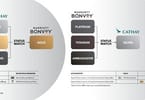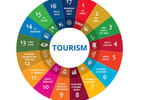Japan set up its first national tourism agency on Oct. 1 to attract more Asian travelers. The timing could hardly have been worse.
Since the opening of Japan Tourism Agency, the Topix stocks index dropped 24 percent and the yen strengthened 11 percent against the U.S. dollar, making it more expensive for overseas tourists to visit. Ski resorts in Hokkaido, Japan’s northernmost main island, and golf courses are already feeling the effect.
“Golfers from South Korea used to shop for top-of-the-line Maruman clubs, but not any more,” said Norio Maruta, manager of Taiga Country Club, 90 minutes by train north of Tokyo. “Conditions are becoming tougher.”
Japan is trying to cut its reliance on domestic travelers – – a government survey in September showed that more than a third of the nation’s hotels didn’t have a single foreign visitor last year — to offset a declining population and the effect of recession. Japan Tourism aims to lure 10 million foreign visitors in 2010, up from 8.3 million in 2007, and double the number again by 2020.
“Given the sudden rise of the yen and changes to the economy, I think the tourism agency’s target will be difficult to achieve,” said Manabu Kato, a senior analyst at Hamagin Research Institute. “There are still a lot of people who don’t understand what sort of options are available if they visit Japan.”
Won Drops
The number of travelers from South Korea, the biggest visitors to Japan, fell 21 percent in September from a year earlier. The Korean won dropped 31 percent against the yen in the three months through October. Tourists from Taiwan, which ranks second, declined 13 percent, according to the Japan National Tourist Organization, an industry-backed group.
Australian reservations for ski tours this season in Hokkaido have fallen as much as 30 percent from last year, said Shoko Abe, of Kinki Nippon Tourist Co. “Cancellations are up, and new bookings are falling,” she said.
The Australian dollar has fallen 41 percent against the yen to 61.76 yen at 3 p.m. in Tokyo today, from its peak of 104.24 yen on July 22.
More foreign visitors would help offset Japan’s shrinking population. Foreign tourists spend about 180,000 yen ($1,860) per visit, said Tetsuro Hirata, senior director at the agency’s International Tourism Division. Residents spend 1.21 million yen each per year, so seven visitors are needed to balance consumer spending each time the population shrinks by one.
Consumer Sentiment
“The economy now is the factor most affecting travel,” said Akiyoshi Takumori, an economist at Sumitomo Asset Management Co. in Tokyo. “The sentiment of consumers is likely to get worse for the next half year or so.”
The number of visitors from all countries fell 2 percent in August from the previous year, the first drop in 30 months, and slid again by 6.9 percent in September and 5.9 percent in October for the first consecutive declines since a three-month period ended June 2003, when an outbreak of Severe Acute Respiratory Syndrome in Asia caused a 20 percent drop in regional travel, said JNTO.
Instead, it’s the Japanese who are packing their bags as the currency gain prompts a host of “En-Daka,” or strong-yen banners at tour shops to attract locals looking to go abroad.
HIS, a Japanese discount travel agency, offered three-day package tours to Korea for 20,000 yen, down from 35,000 yen. A similar trip from Tokyo to Hokkaido cost around 30,000 yen.
December reservations for Korea tours are 68 percent higher than a year ago, according to JNTO.
Seeking Big Spenders
Japanese visitors to Korea in September rose 4.8 percent from a year earlier to 202,229, the steepest gain since September 2004, according to the Korea Tourism Organization. Sales to Japanese at Lotte Duty Free Shops in Seoul and international airports jumped 50 percent in October on year.
The yen’s gain is forcing Japan Tourism to switch tack.
“The strong yen is acting as a headwind, but even in harsh economic times, the wealthy travel overseas regularly,” said Hirata. “We’ll reduce our advertising targeting young people and increase our ads for the rich.”
Many of those rich are Chinese.
Isetan Mitsukoshi Holdings Ltd.‘s Mitsukoshi department store in Ginza, Tokyo’s shopping mecca, said the number of Chinese buying duty-free items was up 25 percent on the previous year as of mid-October.
Duty-free
“Duty-free purchases by Chinese haven’t been affected by economic conditions,” Mitsukoshi spokeswoman Kayoko Shibata said in late October.
Edward Chen, from Hong Kong, is a repeat visitor. He buys high-fashion brands at Mitsukoshi because “clothes here have better designs and quality compared with the western apparel sold in Hong Kong.”
Still, wealthy Chinese are unlikely to offset the drop in spending from domestic and other overseas visitors. Mitsukoshi forecasts sales at the Ginza store will drop 8.7 percent in the year ending March. For ski resorts, the outlook is ever bleaker.
“The reservations we are filling now were placed before the yen got stronger and the economy dived,” said Shoko Shiojima, owner of La Neige hotel at Nagano’s Hakuba ski resort, in operation since 1967. Four-fifths of the 25 rooms at her hotel are typically reserved by foreigners. “From my long years of experience, I’m afraid of what will happen.”
WHAT TO TAKE AWAY FROM THIS ARTICLE:
- “Given the sudden rise of the yen and changes to the economy, I think the tourism agency's target will be difficult to achieve,” said Manabu Kato, a senior analyst at Hamagin Research Institute.
- Instead, it's the Japanese who are packing their bags as the currency gain prompts a host of “En-Daka,” or strong-yen banners at tour shops to attract locals looking to go abroad.
- 9 percent in October for the first consecutive declines since a three-month period ended June 2003, when an outbreak of Severe Acute Respiratory Syndrome in Asia caused a 20 percent drop in regional travel, said JNTO.






















